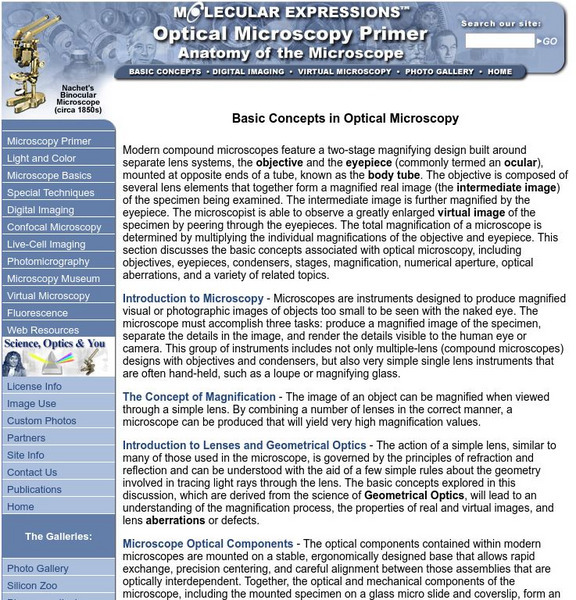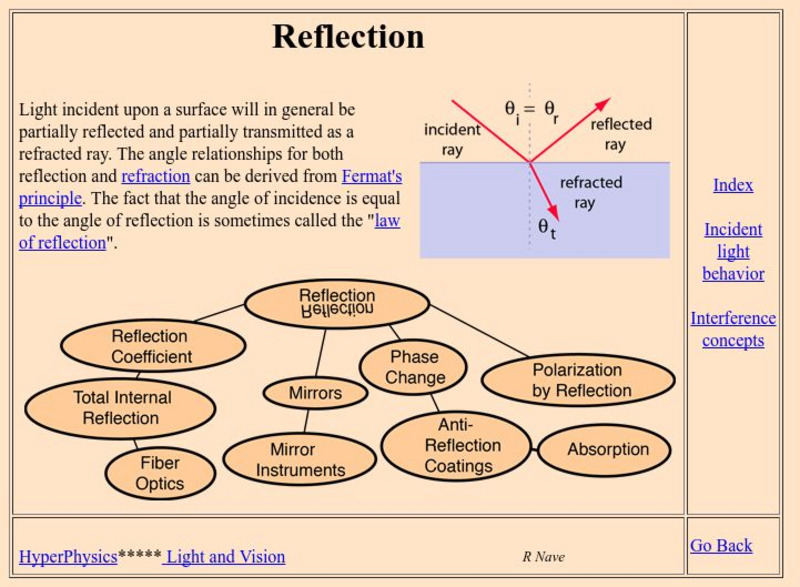Georgia Department of Education
Ga Virtual Learning: Geometric Optics
This interactive unit will help students to understand the basics of geometric optics. Learn what happens when light strikes the boundary between two media as well as the difference between a real and virtual image? Also explore the law...
Georgia State University
Georgia State University: Hyper Physics: Crossed Polarizers
At this univeristy physics department site, the polarization of light is explained and illustrated. Methods for analyzing light to determine the degree of polarization are stated and explained with equations.
Florida State University
Florida State University: Microscopy Primer: Anatomy of the Microscope
The premier web site on the physics of microscopy. Includes several pages and numerous Java applets about microscopes and refraction. Thorough, well-illustrated, interactive, fun, and educational. What more can one ask for?
CK-12 Foundation
Ck 12 Exploration Series: Simulations: Physics: Diamond Cut
[Free Registration/Login Required] A simulation investigating why a diamond shines by looking at refraction, reflection, and total internal reflection.
Physics Classroom
The Physics Classroom: Refraction/ray Model of Light: Determination of N Values
Through illustrated examples and interactive practice problems, students explore the details of Snell's Law.
Physics Classroom
The Physics Classroom: Refraction and the Ray Model of Light: Converging Lenses
The purpose of this tutorial is to summarize object-image relationships by dividing the possible object locations into five general areas or points.
Physics Classroom
The Physics Classroom: Refraction and the Ray Model of Light: Diverging Lenses
In this illustrated tutorial, students will see a specific method for constructing ray diagrams for double concave lenses.
Physics Classroom
The Physics Classroom: Refraction/ray Model of Light: The Mathematics of Lenses
Using the Lens Equation and the Magnification Equations, students determine numerical information about image distance and image size.
Physics Classroom
The Physics Classroom: Refraction/ray Model of Light: Image Formation Revisited
Students take an in-depth look at the physics behind image formation.
Georgia State University
Georgia State University: Hyper Physics: Behavior of Incident Light
This site from Georgia State University is an indexing page for several other pages on the topic of reflection. Topics are treated in an understandable manner and utilize meaningful graphics.
Georgia State University
Georgia State University: Hyper Physics: Atmospheric Optics Concepts
This physics department site features an indexing page for a variety of pages pertaining to atmospheric optics. Topics include rainbows, halos, auroras, mirages, star twinkling, sunsets, green flashes, coronas, and more. Excellent...
Physics Classroom
The Physics Classroom: Refraction and the Ray Model of Light: Anatomy of the Eye
This tutorial looks at the anatomy of the eye and how the sense of sight works. This is the first part of a learning module. Subsequent sections cover how images are formed and detected, the concept of accommodation where the eye adjusts...
Boston University
Bu: Optics: Geometric Optics
Several short descriptions of demonstrations which illustrate principles of geometric optics (many of which focus upon refraction).
Optical Society
Optical Society of America: Optics for Kids: Lose a Glass in a Glass
This is an activity that should only be done outdoors or in a well-ventilated area, with adult supervision, as it involves paint thinner. It demonstrates the concept of the index of refraction for different materials, in this case that...
Ducksters
Ducksters: Physics for Kids: Light
Kids learn about the science of light. Energy made of waves and particles called photons traveling at the top speed in the universe. What is refraction? The difference between transparent, translucent, and opaque.
Optical Society
Optical Society of America: Optics for Kids: Guiding Light Optical Fiber
This experiment demonstrates the concept of total internal reflection, using basic materials. Accompanied by a detailed explanation of what's happening, and links to articles on reflection and refraction.
Physics Classroom
The Physics Classroom: Polarization
"How Do We Know Light Behaves as a Wave?" An answer is provided in this discussion of the polarization of light and the use of Polaroid filters in sunglasses. The four methods discussed on this page are: polarization by transmission,...
Other
Siemens Science Day: Physical Science: Through the Looking Glass
Students will make their own spectroscope, learn how light is bent by a diffraction grating, and explore how various forms of light differ.
Exploratorium
Exploratorium: Critical Angle
Students can see light reflected and refracted in this demonstration. They will also discover the total internal reflection of light.
University of Texas at Austin
The University of Texas Mc Donald Observatory: Super Gelatin
Students measure the angles of refraction of laser light traveling through gelatin, then plot their data to calculate the gelatin's index of refraction.
CK-12 Foundation
Ck 12: Physics Simulation: Least Time
[Free Registration/Login Required] Explore how Snell's Law arises out of the principle of least time; understand how light rays change direction at interfaces between materials using this interactive simulation. A PDF worksheet and a...
University of Maryland
Optics Highlights: The Telescope
Part of an anecdotal history of optics and the study of light. Extremely thorough treatment of the invention of the telescope. Includes a short biographical sketch and discusses the work of Isaac Newton which focuses on his contribution...
Optical Society
Optical Society of America: Optics for Kids: Make Money Appear Before Your Eyes
A simple experiment that clearly demonstrates how light bends when it passes through water. Accompanied by a good explanation of what's happening, and a link to an article on refraction.








